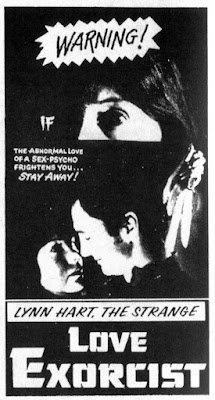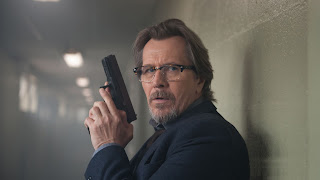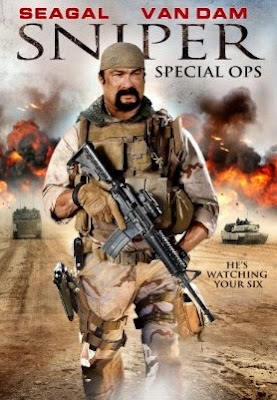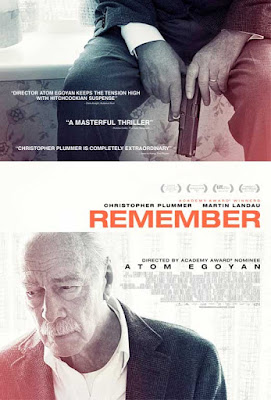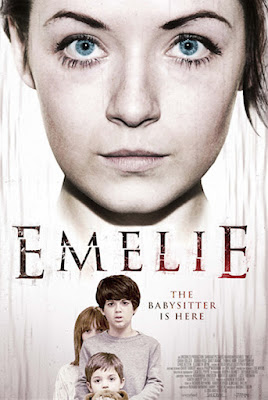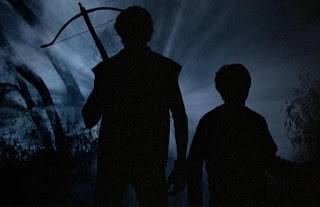HARDCORE HENRY
(Russia/US/China - 2016)
Written and directed by Ilya Naishuller. Cast: Sharlto Copley, Danila Kozlovsky, Haley Bennett, Tim Roth, Andrei Dementiev, Sveta Ustinova, Darya Charusha, Ilya Naishuller. (R, 96 mins)
Genre films have flirted with sequences with first-person POV fleetingly in the past, from relatively recent video game adaptations like HOUSE OF THE DEAD (2003) and DOOM (2005) and any number of 1970s-and-onward slasher films where the killer stalks their next victim (most recently done in the remake of MANIAC with Elijah Wood). Robert Montgomery's ambitious Philip Marlowe noir LADY IN THE LAKE (1947) was the first film to extensively tell a story through the first-person POV of the main character, only seeing what they see ("Starring Robert Montgomery...and YOU!"). The mostly English-language, partially Indiegogo-funded Russian import HARDCORE HENRY takes that concept to its absolute extreme (or "X-treme," if you prefer), with the entire 96-minute film seen from the POV of the title character, a dead and partially dismembered man reanimated as a cyborg, outfitted with a durable new arm and leg and annihilating everyone in sight on a mission of vengeance. It's no surprise that, with its first-person shooter gimmick and frequent weed references (like "4:20" spray-painted on a wall) that it's a prefab cult movie geared toward gamers and stoners, which certainly has some union on a Venn diagram. And though it would defeat the whole purpose of the project, you can't help but question whether, given the impressive nature of the stunt work and the chase scenes, and that it was shot in some run-down and apocalyptically atmospheric sections of Moscow that can barely be discerned with the non-stop camera movement, HARDCORE HENRY would've played a lot better had it been shot in a conventional fashion.
Looking not unlike a co-production between the Russian mob and Red Bull, HARDCORE HENRY works surprisingly well for about 30 minutes, with some kinetic energy and chutzpah in its balls-to-the-wall, anything-goes mentality and it's buoyed by some truly hair-raising stunt work. But by half an hour in, it's played all of its cards and has no choice but to keep endlessly repeating itself. What was initially fun and gleefully over-the top--the violence and splatter here stretch the limits of the R rating about as far as it can go--turns deadening and headache-inducing as the gimmick runs its course in record time. Naishuller, a music video vet who shot several videos for the Russian punk band Biting Elbows in the same first-person-fashion (obviously, this is Naishuller's "thing"), is a protege of NIGHT WATCH director Timur Bekmambetov, who was the key producer here. The technique works in small doses, and this could've been an effective short film, but it doesn't take long for HARDCORE HENRY to turn into a toss-up between a Buzzfeed viral video designed to be watched on your phone, or DREDD re-imagined as a Russian dashcam video. Viewers with a low tolerance for shaky cam will bolt in record time, and Naishuller doesn't even try to rein in Copley, who seems to approach every role like he's Robin Williams on a talk show. There's some inspired moments scattered about--a bunch of Jimmy's various avatar incarnations doing a rendition of Cole Porter's "I've Got You Under My Skin," where Copley manages to pull off without being irritating; an argument yelled in Russian represented by overlapping, illegible subtitles; and a happy accident involving the actor playing Henry in a chase scene accidentally plowing over a stuntwoman on an escalator and Naishuller leaving the gaffe as is. He also acknowledges the the importance of LADY IN THE LAKE to the first-person POV motif by its poster being visible on one character's living room wall.
It's commendable that Naishuller sticks to the rules he establishes and fully commits to the first-person ethos, but does that automatically mean it's a worthwhile film? From the buzz at Toronto and SXSW this year, it seems that the glowing reviews were praising the technical accomplishment more than the film itself, which was an issue with another recent gimmick film, the 138-minute unbroken, single-take VICTORIA. HARDCORE HENRY has some ballsy ideas, but it simply blows its load too quickly, lacking the staying power for a 90-minute movie. Many of the jokes are cheap and lazy, like Jimmy listening to Leo Sayer's "You Make Me Feel Like Dancing" in his SUV, the punchline apparently being "There's a cheesy disco tune I recognize ironically," or Henry hopping on a horse, accompanied by the theme from THE MAGNIFICENT SEVEN. Tim Roth has about 30 seconds of screen time as Henry's father in his one human memory remaining, and it would appear his shots were done in Los Angeles by a separate crew listed in the credits, with someone even getting a "Dialect coach for Mr. Roth" credit when he has three lines of dialogue and uses the same RESERVOIR DOGS American accent he's been using for the last 25 years. And in this era of trigger warnings and delicate snowflake sensibilities, when is someone going to stand up for the albinos of the world and how the pigmentally-challenged have been treated by the movie industry? Approaching his role as if Akan is a Bond villain's henchman working on his own nefarious, global domination plot in his downtime, Kozlovsky is appropriately cartoonish, but saddled with numerous groan-inducing quips that land with a thud. When's the last time you saw an albino in pop culture depicted as just a normal person? When Edgar Winter last had a hit single?








